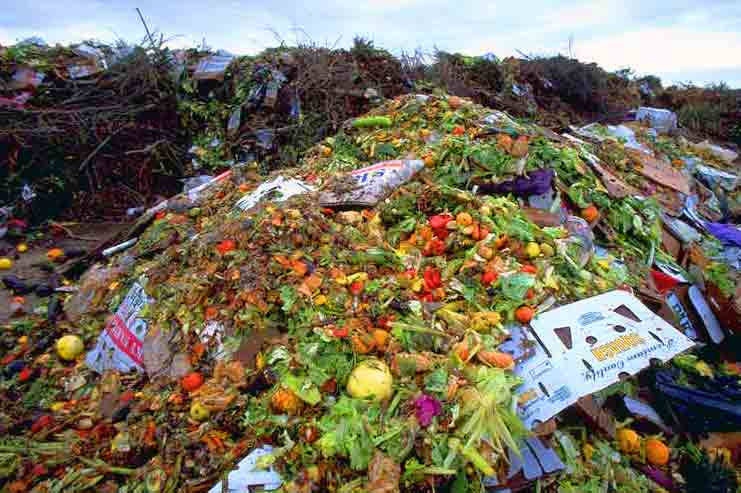
While hunger pangs are the fiercest of fires, there are 800 million people the world over, who go to sleep each night, with this burning fire unappeased. Mahatma Gandhi once said, “There are people in the world so hungry, that God cannot appear to them except in the form of bread.”
Yet, in a ridiculous contrast, an estimated 1.3 billion tons of the world’s food go waste annually, and are thrown in landfills, according to the United Nations Food and Agricultural Organization (FAO).It appears that developed countries trash 670 million tons of food worth about US$ 680 billion every year, while developing countries follow closely, with 630 million tons, worth about US$ 310 billion. FAO finds that people in affluent countries waste as almost as much as the net food production of Sub-Saharan Africa, and the total amount of food wasted and thrown away every year is equal to more than half of the world’s annual cereal crop.
The visual impact of this colossal waste is more shocking when measured by what we eat on a daily basis. For instance, in the UK, 24 million slices of bread, 5.8 million potatoes and 5.9 million glasses of milk go waste every day. Research by Exodus Research, Ipsos-Mori and Resource Futures, finds that 86 million chickens are thrown away each year, despite chicken being UK’s favorite meat, and4.4 million whole apples are trashed daily, despite the English belief of an apple day keeping the doctor away.
In the US, the Department of Agriculture (USDA) which monitors food wastage, reports that dairy products make up the largest component of annual wasted food, amounting to about $91 billion. Doug Rauch, former president of Trader Joe’s Company, said, ““Grocery stores routinely trash produce for being the wrong shape or containing minor blemishes.”
Two institutions, Johns Hopkins Center for a Livable Future and the Ohio State University, in 2015 and 2016 respectively, carried out studies to find why Americans waste a third of the food the country produces. The first study found that a leaking faucet or leaving a light on bothered Americans more than throwing food away. This is probably becauseAmericans spend less on groceries than any other community in the world.According to USDA calculations based on August 2016 Euro monitor International data, Americans spend just 6.4% of their budget on food, while Germany spends 10.3%, France 13.2% and China 14.1%. On the other hand, people in poor countries spend about half of their budget on food, like 56.4% in Nigeria and 41.9% in the Philippines.
A recent survey by the American Chemistry Council found that American households throw away $640 worth of food each year, which is quite negligible, and they are not concerned about the environmental impact of trashed food piling up in landfills. It appears people underestimate the amount of food they throw away. Over half the surveyed people said they discard only 10% of their food, and 13% said they don’t throw anything away. But when asked why they throw food, people said it was primarily about food safety and the desire to eat what was freshest.
According to HelloFresh, color and presentation of food is just as important as freshness for consumers, as they allow the eyes to feast on the meal before delighting their taste buds.
A fact that came across strongly in studies is that people, though they waste food, are disturbed by the implications of that action. Steve Russell, Vice President of a trade organization for chemical companies, said, “For years we’ve been told to finish your plate, there are hungry people. I just don’t think we’ve done a good enough job yet talking about the environmental impact of food waste.”Author Brian Wansink, says, “What bothers most people is that it makes them feel foolish … having to admit you were wrong to prepare so much food or serve so much food if we’re not eating it.”
Nevertheless, responsible-minded leaders of organizations, communities and countries, feel guilty and chagrined at this unjustifiable wastage. Once information was presented in credible form, they decided to do what they could to rectify the abominable squandering.
The EuropeanParliament, adopted a resolution in January 2012, to ensure a 50% reduction in food wastage by 2020. They also promoted economizing by naming 2014, “The European Year against Food Waste.” Germany’s Agriculture Minister. Christian Schmidt said, “Food belongs in your mouth and stomach, not in the garbage bin,” and proposed a plan to reduce food wastage by 50% by 2030. In France, supermarkets are banned from throwing or destroying unsold food. By law, they need to donate it to charities or for animal feed.
In the UK, retailers like Marks and Spencer’s introduced a ‘Fresher for Longer’ initiative, to change people’s perceptions on food packaging, while Sainsbury’s launched a ‘Make the Most of Your Roast’ campaign and introduced leftover recipes. Warburton’s and Kingsmill introducedsmaller loaves of bread to minimize wastage.
In the US, food wastage at different levels of the food supply chain were identified and recommendations were made to resolve issues. For instance, instead of throwing away carrots when they were too bent or curvy to meet retail standards, “baby carrots” were made, which added sophistication and quality to the product. During the time of President Barack Obama, a public sector-private sector campaign was established to cut by at least half, by 2030, the over two million calories Americans waste every year. The plan was to improve food efficiency, recycle, decode food labels and create ways to get the extra food to the one-in-six Americans who go hungry to bed. There were also startups like Bay Area’s Imperfect Produce, which offered discounted products that did not look pleasing but were worthy of consuming.
As former FAO Director-General Jacques Diouf, said, “Hunger is not an issue of charity. It is an issue of justice.”
If you would like to contribute an article or contact our contributors, you can get in touch here
